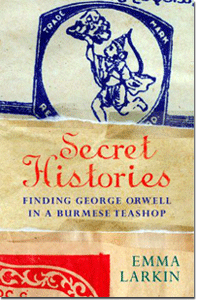By searching for George Orwell’s past, Emma Larkin reveals his relevance to Burma’s present.
|
|
|
Review of Secret Histories. Finding George Orwell in a Burmese Teashop, by Emma Larkin. John Murray, London: 2004: 232 pp. |
It’s not a bad way to spend one’s time, becoming a habitu้ of teashops, chatting to other bibliophiles, intellectuals, students, and the occasional nasty official. These unique spaces of Burmese life are the primary sources for Emma Larkin’s rich new book, Secret Histories, as she follows the trail of George Orwell’s time in colonial Burma.
Orwell spent five years during the 1920s as a policeman in the British colonial service, which Larkin argues “was the beginning of [his] uncanny and prophetic trilogy which told the history of present day Burma”, through the novels Burmese Days, Animal Farm and 1984.
Larkin spent nearly ten years following Orwell’s career, to all his postings in the country, including Mandalay, Rangoon, Syriam, Twante and Myaungmya in the Irrawaddy Delta, Moulmein, and finally the bleak outpost of Katha in northern Burma, the setting for Burmese Days.
Burma made a powerful impression on Orwell. After all, he shot an elephant, watched men hang, hunted dacoits and murderers, beat up a few young boys at a train station, kept servants that he occasionally mistreated, and possibly had a Burmese mistress. He studied Hindustani, Burmese and even some Karen, expressing contempt for foreigners who didn’t bother to learn anything other than ordering around the “help”. These experiences were pivotal in the transformation of the Empire-bred Eric Blair to the radical George Orwell.
Larkin’s research is systematic and illuminating, having read seemingly everything written by and on Orwell, she tracks down the faded path of his experience in colonial Burma. Unlike many observers she also speaks the language, conveying insightful interviews, random conversations, and everyday humor that is refreshingly candid and honest. This form of political travelogue is one of the most accurate accounts written on the country.
The search for Orwell’s past is essentially a device to investigate the nature of military rule in modern Burma, mostly through a network of teashops. By delving into these redoubts of gossip and speculation, Larkin illuminates the Burmese art of kaw la ha la (rumors) and the skewed worldview that so many people denied opportunity for movement, expression, and education, through circumscribed thought and action, are reduced to. The enduring power of dabaung (prophecy) is one product of authoritarian rule. “These rumors and prophecies load the air in Burma with a sense of magic and foreboding: there is always an unnerving feeling that something is about to happen.”
The impromptu book clubs Larkin assembles discuss the Burmese interpretations of Orwell’s work: the ‘trilogy’ and the celebrated essay “Shooting an Elephant”. Through these conversations and through the vignettes of everyday life by writers, dissidents, political prisoners and many others, it is clear that Orwell’s general views on oppression, how it is organized and its effect on people has a powerful relevance to modern Burma.
But the only time Secret Histories looks like derailing is when she draws the parallels between 1984 and junta-ruled Burma too closely. Only through her skill as a writer does she avoid the clich้s such easy comparisons invite. There are certainly the same Orwellian hallmarks of authoritarianism in Burma, including thought control, Newspeak and other assorted methods of propaganda, censorship and the regime’s distortion of history and current affairs.
But to argue that Burma holds the subliminal keys to Orwell’s political masterpieces is a bit of a stretch, although there are certainly echoes of the writer’s experiences in them. The betrayal of his anarchist unit in the Spanish Civil War by the Communists, the brutality of European fascism and the horror of Stalin’s purges during the 1930s would probably have exerted greater influence over Orwell for Animal Farm and 1984 than the bureaucratic colonialism he grew to despise in Burma.
There is also a stark difference between Orwell’s bleak vision of an industrial dystopia and Burma’s largely rural stagnation. But what both systems do have in common is self regulation ensured through fear. As one Burmese remarks to Larkin, “it doesn’t make any difference whether they have informers or not. It is enough that we believe that their informers are everywhere. After that, we start to do their work for them.”
As fascinating as the hunt for Orwell is, the real strengths of the book are in Larkin’s rendering of voices from a host of interesting people she encounters, their hope, despair, anger and inventiveness. Many ordinary Burmese are now reduced to speculation and the trade in half-truths, peering into teacups for some indication of the future. Forty years of military rule has produced a dictatorship of tasseography, where people whisper instead of talk and everyday life is calibrated for survival. “Don’t write about life,” the censors warned one poet Larkin talks to. Orwell would recognize this system, and also acknowledge the ability of people to eventually overcome it. Secret Histories is homage to the people of Burma and their endurance.
David Scott Mathieson is a PhD student at the Australian National University.

